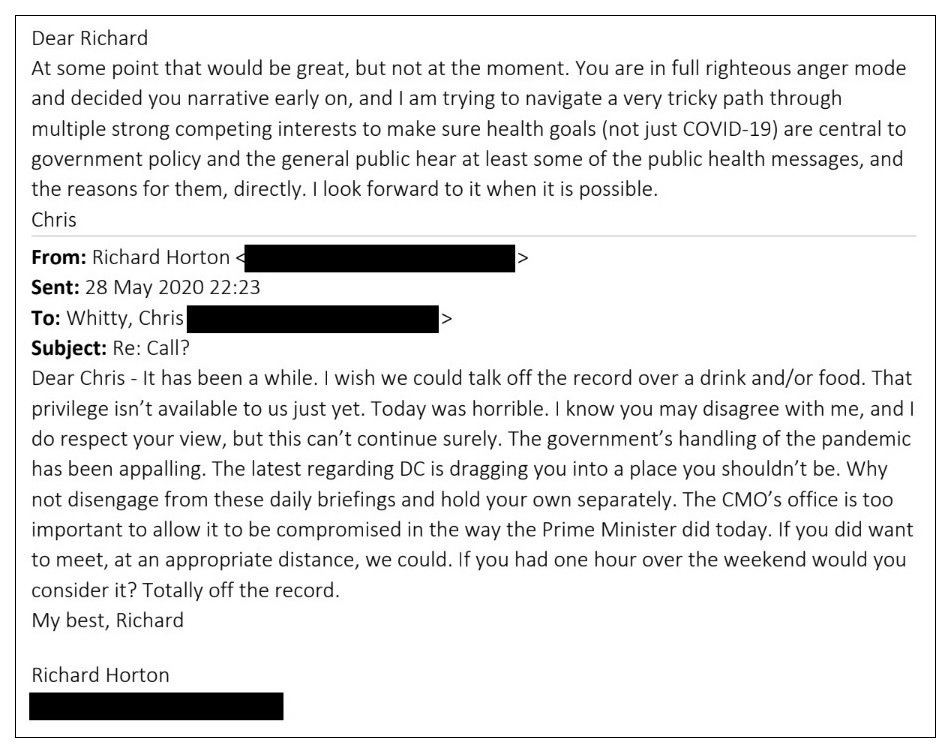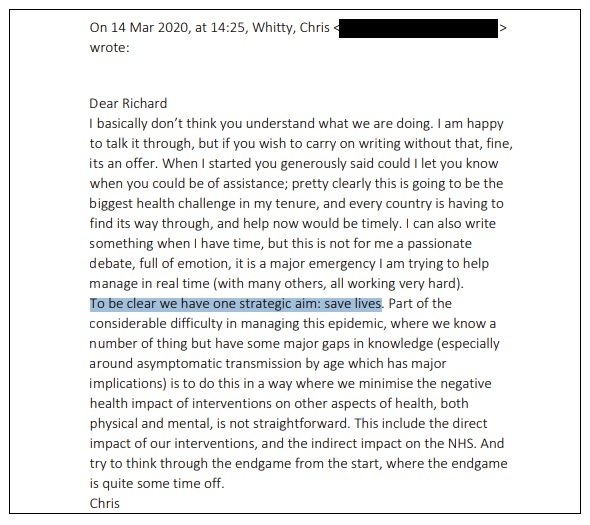Revealed: Chris Whitty’s response to Boris Johnson critics
Emails have revealed how Chris Whitty tried to “navigate a very tricky path” during the pandemic, as he faced claims that he was professionally compromised by Boris Johnson.
In rare political comments from May 2020, England’s chief medical officer admitted: “I am trying to navigate a very tricky path through multiple strong competing interests to make sure health goals (not just Covid-19) are central to government policy and the general public hear at least some of the public health messages, and the reasons for them, directly.”
It followed controversy as Boris Johnson blocked Whitty from publicly commenting on the scandal over his adviser Dominic Cummings – who had travelled to Barnard Castle during lockdown.
In the emails, obtained by openDemocracy through a Freedom of Information request, Whitty rebuffed direct criticism from Richard Horton, the editor of The Lancet medical journal.
Horton had described the government’s Covid response as “appalling”, telling Whitty: “The latest regarding [Cummings] is dragging you into a place you shouldn’t be.”
He added: “Why not disengage from these daily briefings and hold your own separately. The [chief medical officer]’s office is too important to allow it to be compromised in the way the prime minister did today.”
But Whitty responded to his email, saying: “You are in full righteous anger mode.”

As editor of The Lancet for nearly 30 years, Horton is one of the most influential figures in the UK’s medical community. His emails to Whitty ran in parallel with a series of newspaper articles condemning the government for not doing enough to tackle Covid, in which he warned that up to 400,000 people could die in the UK. It came after initially downplaying the risk of the virus, in January 2020, saying there is “no reason to foster panic” due to the virus’s “moderate transmissibility”.
Horton has previously been the subject of controversy as the editor responsible for publishing Andrew Wakefield’s 1998 paper which raised unfounded doubts about the safety of a childhood vaccine, triggering years of vaccine conspiracy theories.
In another email exchange between Horton and Whitty – shortly before the first national lockdown was announced in March 2020 – Horton said: “The news from China and Italy has, it is true, made us feel that more assertive policies should be introduced.”

Whitty replied later in the month, saying: “I basically don’t think you understand what we are doing.
“When I started [as chief medical officer] you generously said could I let you know when you could be of assistance; pretty clearly this is going to be the biggest health challenge in my tenure, and every country is having to find its way through, and help now would be timely.”
He added: “This is not for me a passionate debate, full of emotion, it is a major emergency I am trying to help manage in real time (with many others, all working very hard).”
“To be clear we have one strategic aim: save lives. Part of the considerable difficulty in managing this epidemic … is to do this in a way where we minimise the negative health impact of interventions on other aspects of health, both physical and mental, is not straightforward. This include[s] the direct impact of our interventions, and the indirect impact on the NHS. And try to think through the endgame from the start, where the endgame is quite some time off.”
In June this year, Whitty gave evidence to the UK’s Covid inquiry, where he said the UK “did not give sufficient thought” to how Covid could be stopped in its tracks.


